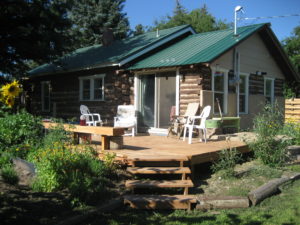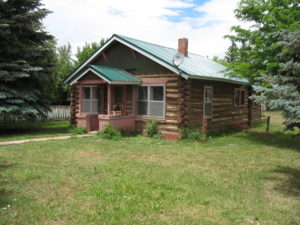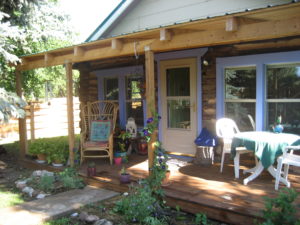by Jenny Rose | Mar 23, 2017 | A Flourishing Woman, The Journey
When I came to Maine from Colorado, I left behind a small log house on four lots in a mountain town of about 1,000 people. I was fortunate enough to find good renters. I’d never been a landlady before, but the prospect of renting was less overwhelming than actually trying to sell the house while making the huge transition to Maine.
My childhood consisted of moving from here to there frequently, and the constant upheaval and insecurity was hard. I didn’t really make friends or invest in any particular place, because I never knew when we would have to pack up and go again. By the time I was a teenager, my family had settled down, but by then I was getting ready to go out into the world and make a place of my own, so there still wasn’t any security.
Then I got married and had children, and finding a home was largely driven by my husband’s wants and preferences and what our young family needed, not by my own desires. It became apparent over my years of marriage that the house that appealed to me and the house that appealed to my husband were rather different in terms of location, style and layout. We moved from place to place, and I made do wherever we were — a skill I had a lot of practice with. It was the family that mattered, I told myself, not the house.
When the boys were ready for school, though, it was important to me to settle down somewhere, as I didn’t want them to have the experience I did of always being the new kid in school. At that point we moved to the little town referred to above, where I stayed for more than 20 years. The house we bought when we moved there sheltered us, along with dogs and cats, but I never really liked it. Once again, it had been my husband’s choice.
Fifteen years passed and I found myself alone with a cat in a big house I’d never loved that hijacked me with ghosts and memories everywhere I turned.
I sold the house, discarded a lot of stuff and, after a couple years of searching, heard of a dilapidated old log house that had been rented that was about to go on the market. One of my friends was a neighbor, and one spring morning we went to walk around it.
It needed a lot of work, but I was charmed. My friend went up 3 cement steps in the back, found the back door open, and we walked in.
It was outdated, tiny, inconvenient and badly neglected. Everything, inside and outside, was frayed, ragged, used up, dusty and dirty.
Falling in love is a strange thing. What is the complex, mysterious response a person, object or place calls from us? It’s got nothing to do with beauty or even suitability, that’s for sure, at least not for me.
I felt akin to the house. There it sat, and had been sitting for over 100 years, on a weedy and trash-filled patch of ground with large old trees around it, unloved, unseen and unappreciated. It was small and ugly and shabby. I myself had never noticed it in all my 15 years in that town.
Nobody loved or wanted it.
That’s what captured my heart.
Nobody loved it.
But what if somebody did? What if somebody wanted it, cleaned it up, gave it some care and attention?
 So I bought it, remodeled one end, gave it new windows and a new front door. I had the wood floors stripped, sanded and sealed. I insulated, put in a little wood stove, patched and painted. I raked up bags and bags of trash and built garden beds out of cardboard, newspaper, huge loads of manure and fill dirt, moldy straw and hay and compost. I hung birdfeeders and wind chimes in the trees.
So I bought it, remodeled one end, gave it new windows and a new front door. I had the wood floors stripped, sanded and sealed. I insulated, put in a little wood stove, patched and painted. I raked up bags and bags of trash and built garden beds out of cardboard, newspaper, huge loads of manure and fill dirt, moldy straw and hay and compost. I hung birdfeeders and wind chimes in the trees.
I didn’t know it then, but in loving that house and bringing it back to life, I was taking the first steps in loving myself, and eventually leaving that little town for a bigger, wider world.
I lived in the house for five years, and I was struck, over and over again, by how the house and land responded to every bit of attention I gave them. They never shrank away from me. I never failed or disappointed. The place blossomed. It bloomed. The garden grew. The trees filled with birds. Sunlight poured in the new windows and turned the old floor to the color of honey. Indoor plants throve on the wide windowsills.
The house was like a mirror. It reflected back to me creativity, color, light, modest luxury, simplicity. As I lived my life in it I saw myself differently than I ever had before. I had made a beautiful place, peaceful and welcoming.
For the first time, I thought maybe I had something to offer the world. Maybe I was of some use after all.
In my head, it was all settled. After nearly 50 years of moving and being subject to someone else’s needs and choices, I had come home. For the first time in my life I allowed myself to put down deep, deep roots. I filled the house with my music, my books, my spiritual work, my art, my hopes, dreams, desires, fears and griefs. I joyfully lived without clutter, piles, and collections of junk that weren’t mine. I burned candles and incense and had flowers by the kitchen sink and in the bathroom.
Never again would I have to move. I was safe. I laid in bed at night and felt the house around me like sheltering wings. I had at last realized the deepest and most painful desire of my life — a real home. I would live the rest of my days in safety, serenity and security. The house and I belonged to each other and took care of one another.
Last month I put the house up for sale, and last week it went under contract.
I don’t know how to express all the thoughts and feelings that led me from that place to this. To say I emotionally outgrew it feels true. To say my old life began to feel much too small is also true. Gradually, I understood a house can’t provide me with the safety I’m always looking for, after all. I thought I’d reached the highest peak of my own desire and possibility, but when I got there and looked around, I began to see higher peaks still.
I’d created a home and called it a life.
I was also aware my love for the house exceeded my love for myself. Part of me still waited for someone to show up and do for me what I did for the house. Inside me, a sweet maiden stayed powerless and waiting for a prince on a white horse, but I wasn’t a maiden. I was a menopausal woman, expert in the art of pleasing people, with two adult children, two divorces and a history of abuse. It was too late for the prince thing, and I was bored by it anyway. What was a downy-faced idiot prince going to do with a woman like me?
I recognized the more mature (ahem!) parts of me were simply lonely for healthy, meaningful connection with other people, and no house, no matter how beautiful, comfortable or beloved, could give me that.
Then there was the anguished voice from deep inside, imprisoned somewhere behind my rib cage, that kept saying “I can do more than this! I can be more than this!”
Anyway, I chose to leave Colorado, the house and my life there, though it was like tearing myself in half. Still, I’ve never regretted that choice, and I know now that I don’t want to go back to my old life and that little town — even if I could.
The house I’m in now hardly notices me. It needs nothing from me, and nothing I can do will fix all that needs fixing and update all that needs updating. This is frustrating, at times infuriating, and oddly peaceful. All the energy and love I used to give my home is now going into my writing and into shaping myself and a new kind of life. In a strange and convoluted way, leaving the home of my dreams has at last brought me into direct, intentional and mindful relationship with…me.
I wonder if perhaps I’m the home and safety I’ve always been searching for. How ironic.
I’ve been weeping on and off as I let go of my house. I want to do it, and it hurts. I wonder if I’ll ever have that again — such a perfect home. I wonder about the new owner, who is also a single woman. I hope she feels as sheltered and nurtured there as I did. I hope she’ll touch the trees and feed the birds and glory in the iris and roses and clematis. I hope the owls will wake her in the deep winter nights, calling from the huge pine trees in front. I hope she draws close to herself as she sits in the sun where I sat, sleeps under the ceiling I had patched and painted myself, feeds the wood stove, washes dishes and relaxes in the bathtub.
I hope she and the house will love one another and be happy together.

All content on this site ©2017
Jennifer Rose
except where otherwise noted
by Jenny Rose | Aug 18, 2016 | Authenticity, Emotional Intelligence

Photo by Volkan Olmez on Unsplash
Do you ever wonder what you’re doing wrong? I do. I’ve been up since 4:30 this morning telling myself I will NOT be stressed and overwhelmed. It’s not working
So I’m going to go with it. I’m going to allow myself to be stressed and overwhelmed. I’m going to stop running away from the feeling and embrace it, drooling, like a spider with a plump licorice fly, one of those big slow sticky ones you can’t bring yourself to swat because — you know, guts!
The thing I most hate about days like this is that nothing is really wrong. There’s not a crisis. It’s just life. Everyone deals with life. My life is far, far easier than the lives of many others. Why am I such a jerk that I can’t deal effectively with a perfectly normal day? Why do I have to make such a big deal over everything? Why can’t I suck it up, stop whining, pull up my panties and put big girl socks on?
I own a little black Elantra. I bought it used, paid it off, rarely drove it in my old life because I was in a small town and walked everywhere. I kept it clean, kept it serviced and loved it.
Then I came to Maine and it became the only household car. That’s okay. My partner is a great driver and he’s reasonably neat and tidy. It’s not like having complete control of the fan, the AC and heat, the radio and the windows, but I can live my life without complete control of the car. I’m an adult. I can share.
Then my two adult sons came to Maine. They came in a U-Haul. Without a car.
Just to be clear, they’re both well over six feet tall. I’m talking about a Hyundai Elantra.
They also work at a local organic farm that raises vegetables, pork and dairy.
Now the four of us share a car.
Sigh.
I love my sons. I really, really do. I keep telling myself that.
The car Kleenex disappeared because one of them caught a cold. The lid to the wet wipes came off and when I unearthed them from under the seat they were all dried out. I pulled down the mirror on the passenger side to put lip balm on and the mirror was splashed with dried blood. (“I was playing with my girlfriend’s puppy, and his tooth caught my nose and ripped it, and there was blood all over and it was the only mirror I could find — sorry, Mom.”) The cloth grocery bags wound up on the floor under work boots caked with…uh…farm stuff. The back seat is covered with dirt because they had to haul potatoes from a far field back to the house. There are assorted Gatorade and plastic water bottles rolling around in every stage between full and empty. The seat and mirrors are never in the right place for me, but as I rarely get to drive anymore, I suppose it doesn’t matter.
Don’t even get me started on the issue of gas! (“There’s enough to get to town Mom. I swear to God!”)
Then, two days ago, we got a call from them at a time when they should have been safely and gainfully occupied weeding and harvesting in one of the farm’s massive gardens. You know, earning money to buy themselves a car? The front passenger wheel on the Elantra started making a terrible noise and they pulled over.
So, everyone knows the drill, right? You arrange for a tow, pick a garage or mechanic for a destination, adjust your schedule, find a ride. We did all that. Then you wait, if you’re me, with dread for the diagnosis, obsessively moving money from here to there in your head, wishing you hadn’t bought that expensive thing last week, calculating your next paycheck, figuring out where the money is going to come from and what bills can be late.
In the meantime, we all complained about all the things we were going to do in the next couple of days. What about work? What about the laundromat? What about cashing checks? What about groceries? What about my swimming day? All of a sudden, sharing a car seemed like a piece of cake when compared to having no car at all.
Then came the list of diagnoses, the bottom line dollar figure, the realization that we were half way there and might as well take care of everything that needed taken care of. It’s not as though there’s ever a good time to fix a car. Nobody sits on the side of the road and says, “Oh, good! This is the perfect time to have the car break down! I just happen to have a spare few hundred dollars right now!” At least no one does at my income level.
Then we waited a little while and the phone rang and it was fixed. But we couldn’t go get it because it was in the shop and we were at home.
We’re in rural Maine, so we called a local cab. (Item: On the dashboard a sign with the fare price, including “Puke charge $100. You clean it up.”) Fortunately, no one puked. We got to the shop. We wrote a check. We got the car.
All that was yesterday. So why, I ask you, was I lying in bed awake at 4:30 in the morning agonizing about it all? The car was right outside the window, parked in its spot, fixed and paid for. True, I paid for it out of my mortgage money and now I’ve no idea where the mortgage is coming from. On the other hand, the mortgage isn’t due until September 1, so there’s time, right? I’ll figure something out, or my partner will get a client, or something. Also true that the upcoming day (today) was complicated. I wanted to take my weekly swim. We all had things we needed to do, most of them involving using the car. I had this post to write, in addition to working on my book. My brother is coming to visit Friday, so I wanted to clean a little, change the sheets (hence the laundromat), etc. We all work on Friday, so today was the day to GET ORGANIZED.
Stop it, I told myself. Sleep. It’s not even light yet. We’ll figure out what everybody needs and

Photo by Todd Quackenbush on Unsplash
make a plan. It will be fine. Don’t think about the mortgage now. Stay in the moment. Breathe, dammit! RELAX. Whatever happens, you’ll get to swim. Think about that. The car is fixed. Your brother doesn’t care what the house looks like. Just think about the pool, cool, quiet, the rhythm of stroke and breathing. A locker room filled with women! Not a guy in sight. You’ll figure out what to blog about.
But what WILL I blog about? What can I write that’s intelligent, sympathetic, well thought out and interesting? I know, I’ll write about…no. No, that’s no good. My mother will read that and be hurt. Well, then, I’ll write about…no. If I write about that the kids will take it the wrong way. Oh, I’ve been wanting to talk about…mmm uh-uh. My friend will read that and she’ll feel bad.
Oh, good. Back to people pleasing, are we? You know you can’t write around that. Might as well give it up now. Hardly anybody reads the damn thing, anyway. It’s a waste of time and it’s not income producing and the car just cost $300…!!! WHAT ABOUT THE MORTGAGE? What am I going to do?
So I got up. At 7:00. And I hated myself because I wasted three hours tossing and turning when I could have gotten up and WRITTEN THIS POST.
“Honey,” said my partner, “if you feel overwhelmed, write about that. Write where you are. It’ll be brilliant.”
So we had breakfast, organized the troops, gathered up the laundry, synchronized our watches. I had a narrow window to swim in, but we reached the laundromat, got the laundry going, and my partner settled down with a book, I jumped in the car, raced joyfully to the pool, free at last, and found a sign. “Pool closed until Monday, August 22 due to construction.”
There was no Kleenex in the car, and I needed some.
It’s a beautiful afternoon. The laundry is strung on the line, waving in the breeze. My sons,

Photo by Bruno Nascimento on Unsplash
shirtless, are going lovingly over a used red (some of the red is paint instead of rust) truck they just bought, trying to figure out what it needs to pass inspection. A mechanic in town is going to look at it at 4:30. I haven’t vacuumed, cleaned the bathroom, written a word of my book or made my brother’s bed yet. I still don’t know what I’m going to do about the mortgage.
But I’ve written this post.
All content on this site ©2016
Jennifer Rose
except where otherwise noted
by Jenny Rose | Aug 11, 2016 | Connection & Community, Emotional Intelligence, Shadows
Last week I wrote about stories. This week I want to discuss a powerful element embedded in the stories we tell ourselves — the element of expectations.
This subject is too big and complicated for me to address in a single post. It touches on parenting, every aspect of relationship, and really every aspect of our experience, unless we’re Zen masters. Here’s a sample of what other people are saying about expectations.
I don’t know any Zen masters and I’m certainly not one, so for the rest of us unenlightened beings, let’s consider the subject of expectations and how they work to limit us, others and life.

Photo by Paul Bence on Unsplash
Before I go further, a Google search of the term “expectations” will give you page after page of managing work expectations, and all the articles I looked at tell me expectations are necessary, positive and help companies, businesses and corporations be successful. Which means make money. So, for the purposes of this discussion, let’s put aside professional/work-related expectations. Let’s focus on intra and interpersonal expectations. Let’s be human beings instead of consumers and capitalists.
Expectations arise out of our past experience, our dreams, our hopes and fears, our unmet needs, our assumptions and our culture and family. They can be positive or negative. But expectations, like the stories we’ve created, are uniquely ours. We’ve usually made them up in our heads or accepted them from the overculture without question. I don’t suggest expectations are inherently wrong if we remember they’re just part of the stories we’re telling, but the problem is we don’t remember that. We cling to expectations and invest them with great certainty and power. They become our reality. This all happens internally and it doesn’t occur to us to check out what other people hope for or expect. It doesn’t occur to us to agree on terms or have a discussion. We just assume we’re all on the same page.

Photo by Igor Ovsyannykov on Unsplash
Here’s an example from my own life. My parents divorced when I was a child. In subsequent years, as I’ve married and had my own children, there have been references to “family.” What a “family” does or doesn’t do. What “family” means. The thing is, I don’t think Dad means the same thing Mom does when he talks about “family,” and I’m pretty sure neither one of them means what I do when I use the term.
I’ve never had a conversation with either of my parents about this, but I’m curious about their definitions. For each of my parents, “family” implies several expectations or rules of conduct about which I’m clearly ignorant and which I frequently have felt I’ve failed. Furthermore, I disagree with some of their expectations that I am aware of.
Life is full of words like this. Try these on: Parent, son/daughter, wife/husband, partner, friend, lover, teacher, mentor, girl/boyfriend, volunteer, etc., etc. We can define these terms pretty easily, but attached to each is a set of often invisible expectations. They’re very deep, so deep we never think about them. You know exactly what “family” means, right? No question. I know what it means to me. But other members of my family are clearly working with different definitions. So, who gets to decide? Who’s right and who’s wrong?
No one. Everyone.
And that’s not very satisfying, is it? It would be so much easier if someone could be right and someone could be wrong. Then we’d all know, and we’d all expect the same thing(s).
There’s still a problem, though, and that’s the real heart of this post.
Expectations, even if we could all agree on them, are so often limitations.

Photo by Jeremy Thomas on Unsplash
When we create and cling to expectations of ourselves or life, all our energy and attention is on something we’ve made up or inherited, and that’s so small, compared to the complex, mysterious, terrible, beautiful, enigmatic thing we call life! Our expectations are like a narrow beam of light in a dark universe. We don’t think about all the possibilities we can’t see, all the things we can’t imagine. No, we’re focused on that small beam, and if what it illuminates doesn’t live up to our expectations of self and others, then we’re angry. We break connection. We punish ourselves. We punish others. We blame and shame and try to make events, people, marriages, vacations, new homes, jobs and ourselves be what we expect them to be.
You might have noticed this doesn’t work.
Every parent has their head in their hands at this point!
Now our expectations are a real problem, because we’ve made them so big and powerful we can’t see around them. We can’t step back and consider what is. We can only think about what isn’t. We forget our sense of curiosity and joyous possibility. We only think about how disappointed we feel, how let down we are, how things never work out. We nurse our humiliation and embarrassment about what we’d hoped for, and what other people think of our choices. We make up stories about how we can’t trust people, and we can’t trust life, and we become cynical, bitter and depressed.
We make ourselves and others very, very small.
But we can choose to take the power out of our expectations, just as we can choose to take the power out of our stories. We can search out our expectations and root them up like weeds. We can take our focus away from unmet expectations and look instead at what is present, what is happening, and dream about what might be possible. We can accept our expectations are about us, not anyone or anything else. If they’re not working, we’re the ones with the power to change them.
We have enormous power in one another’s lives. If every single one of us extended to just one other person the question, “What would you like to do?” instead of “You will…” or “You should…” or “You can’t…” what would the world be like? What if you were ten times bigger than the son/daughter/parent/spouse/lover/partner/friend others expect you to be? That doesn’t mean you have super powers. It means you unchain yourself from the limitation of expectations, yours and everyone else’s.
One of the greatest gifts I ever received was this statement: “I want you to be everything you are and nothing you aren’t.” What a tender, respectful, loving way to hold another human being and life! And the best thing about it? We can say it to ourselves. We can start where we have the most power, in the place where no one can stop us or limit us. I say it to you, now, whoever you are, wherever you are. No expectations. No limits.
Live everything you are, be everything you are and nothing you aren’t.
Pass it on.

Photo by Jeremy Bishop on Unsplash
All content on this site ©2016
Jennifer Rose
except where otherwise noted


 So I bought it, remodeled one end, gave it new windows and a new front door. I had the wood floors stripped, sanded and sealed. I insulated, put in a little wood stove, patched and painted. I raked up bags and bags of trash and built garden beds out of cardboard, newspaper, huge loads of manure and fill dirt, moldy straw and hay and compost. I hung birdfeeders and wind chimes in the trees.
So I bought it, remodeled one end, gave it new windows and a new front door. I had the wood floors stripped, sanded and sealed. I insulated, put in a little wood stove, patched and painted. I raked up bags and bags of trash and built garden beds out of cardboard, newspaper, huge loads of manure and fill dirt, moldy straw and hay and compost. I hung birdfeeders and wind chimes in the trees.







